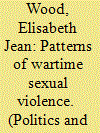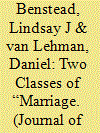| Srl | Item |
| 1 |
ID:
086647


|
|
|
|
|
| Publication |
2009.
|
| Summary/Abstract |
Sexual violence incuding rape, sexual torture, sexual slavery, and forced abortion is a common form of violence against some of the most vulnerable civilians during war. As a result of the mobilization by women's groups advocating prosecution of rape in Bosnia and Rwanda, international legal authorities now prosecute various forms of sexual violence as war crimes, as crimes against humanity, and, in some contexts, as genocide.
|
|
|
|
|
|
|
|
|
|
|
|
|
|
|
|
| 2 |
ID:
139034


|
|
|
|
|
| Summary/Abstract |
The protection of women, children and religious minorities was among the most prominent reasons US President Barack Obama offered for taking military action against the Islamic State of Iraq and al-Sham (ISIS): ‘They kill children. They enslave, rape and force women into marriage. They threatened a religious minority with genocide.’ Obama attributed singular malevolence to ISIS, claiming that ‘in a region that has known so much bloodshed, these terrorists are unique in their brutality’.
|
|
|
|
|
|
|
|
|
|
|
|
|
|
|
|
| 3 |
ID:
089963


|
|
|
|
|
| Publication |
2009.
|
| Summary/Abstract |
In Australia, despite greater public awareness and acknowledgement of the problem by government agencies, trafficking in persons remains a phenomenon poorly understood and researched. The true extent of Australia's human trafficking problem is not fully known, largely due to the clandestine nature of this phenomenon. Anecdotal evidence, media reports, and statistical estimates without proper evidentiary bases are the only sources of information currently available about trafficking in persons in Australia. This article produces a more accurate assessment of the scale of trafficking in persons in the light of the open source evidence, thus contributing to the understanding of the immediate problem, and paving the way for further research on the many facets and aspects associated with trafficking in persons in Australia and elsewhere. The article calls for further research into trafficking and greater openness from relevant stakeholders, in order to clarify the facts about trafficking in Australia, and to help to dispel the myths and misconceptions that abound in discussing this issue.
|
|
|
|
|
|
|
|
|
|
|
|
|
|
|
|
| 4 |
ID:
182865


|
|
|
|
|
| Summary/Abstract |
Some Somali majority clan girls and women receive economic and security benefits from marriage to Al-Shabaab fighters. Yet, the literature treats women’s experiences monolithically and misses the role that race plays in determining the circumstances of such unions. The authors argue that one should not refer to the unions of Somali Bantu girls and women with Al-Shabaab fighters as a “marriage” but rather as sexual and domestic slavery – a form of extraction by Al-Shabaab that works to ethnically cleanse the Bantu from their ancestral land. Drawing on data from an original survey conducted in 2017 of 139 Somali Bantu refugee households who fled to Kenya during the previous year, the authors examine the nature and extent of unions between females from different races with Al-Shabaab fighters. Women and girls from majority clans are more likely to marry fighters freely. Compared to majority clan females, Somali Bantu girls are enslaved by Al-Shabaab fighters at younger ages and typically remain with their own families rather than moving to the man’s household, contrary to Somali’s patrilineal marriage customs. Al-Shabaab fighters do not claim the children they have with Somali Bantu girls and women, whom they despise as a racially distinct minority with low social status. This work underscores the need to avoid the term “marriage” when referring to the sexual slavery of minorities in Somalia by Al-Shabaab and for the international community both to investigate claims of ethnic cleansing as well as support the fledgling Somali government in establishing a system of rule of law.
|
|
|
|
|
|
|
|
|
|
|
|
|
|
|
|